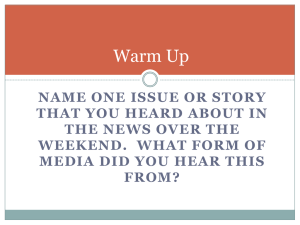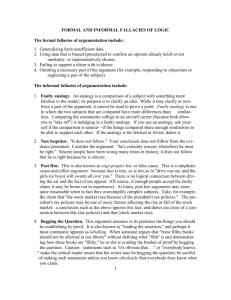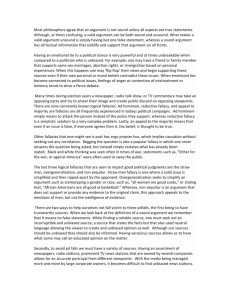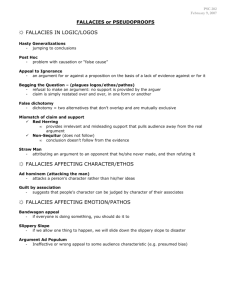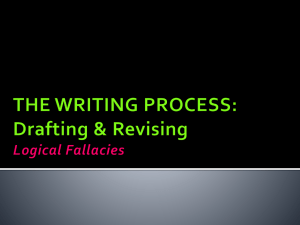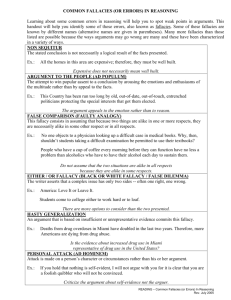fallacies #2 - MrWatsonSOHS
advertisement
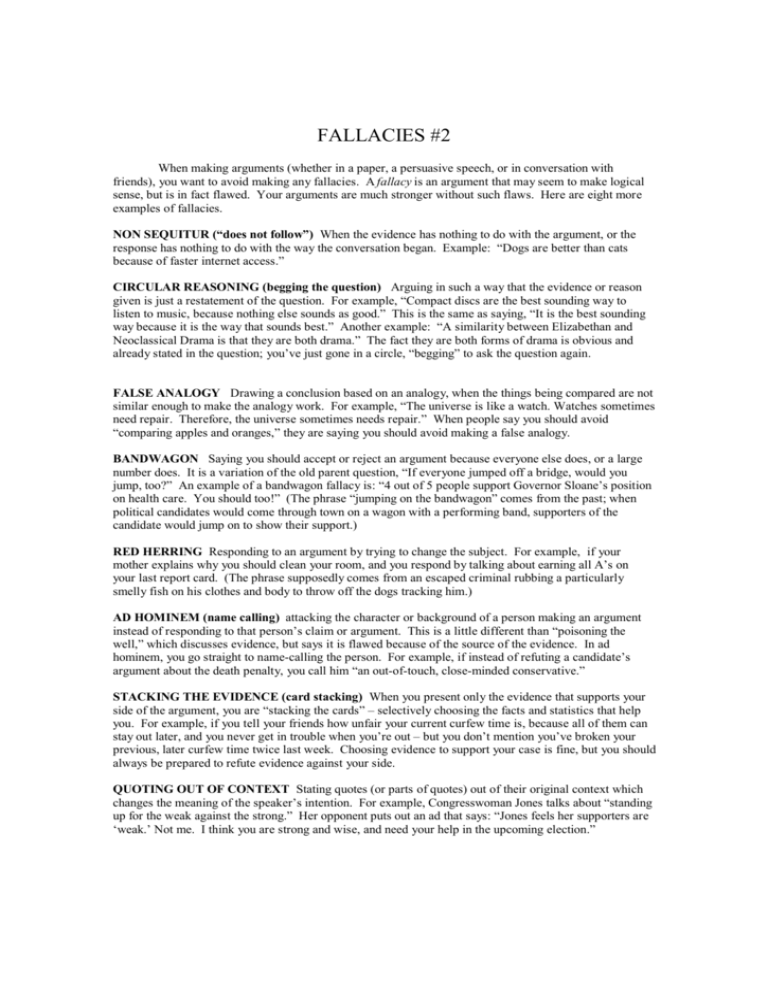
FALLACIES #2 When making arguments (whether in a paper, a persuasive speech, or in conversation with friends), you want to avoid making any fallacies. A fallacy is an argument that may seem to make logical sense, but is in fact flawed. Your arguments are much stronger without such flaws. Here are eight more examples of fallacies. NON SEQUITUR (“does not follow”) When the evidence has nothing to do with the argument, or the response has nothing to do with the way the conversation began. Example: “Dogs are better than cats because of faster internet access.” CIRCULAR REASONING (begging the question) Arguing in such a way that the evidence or reason given is just a restatement of the question. For example, “Compact discs are the best sounding way to listen to music, because nothing else sounds as good.” This is the same as saying, “It is the best sounding way because it is the way that sounds best.” Another example: “A similarity between Elizabethan and Neoclassical Drama is that they are both drama.” The fact they are both forms of drama is obvious and already stated in the question; you’ve just gone in a circle, “begging” to ask the question again. FALSE ANALOGY Drawing a conclusion based on an analogy, when the things being compared are not similar enough to make the analogy work. For example, “The universe is like a watch. Watches sometimes need repair. Therefore, the universe sometimes needs repair.” When people say you should avoid “comparing apples and oranges,” they are saying you should avoid making a false analogy. BANDWAGON Saying you should accept or reject an argument because everyone else does, or a large number does. It is a variation of the old parent question, “If everyone jumped off a bridge, would you jump, too?” An example of a bandwagon fallacy is: “4 out of 5 people support Governor Sloane’s position on health care. You should too!” (The phrase “jumping on the bandwagon” comes from the past; when political candidates would come through town on a wagon with a performing band, supporters of the candidate would jump on to show their support.) RED HERRING Responding to an argument by trying to change the subject. For example, if your mother explains why you should clean your room, and you respond by talking about earning all A’s on your last report card. (The phrase supposedly comes from an escaped criminal rubbing a particularly smelly fish on his clothes and body to throw off the dogs tracking him.) AD HOMINEM (name calling) attacking the character or background of a person making an argument instead of responding to that person’s claim or argument. This is a little different than “poisoning the well,” which discusses evidence, but says it is flawed because of the source of the evidence. In ad hominem, you go straight to name-calling the person. For example, if instead of refuting a candidate’s argument about the death penalty, you call him “an out-of-touch, close-minded conservative.” STACKING THE EVIDENCE (card stacking) When you present only the evidence that supports your side of the argument, you are “stacking the cards” – selectively choosing the facts and statistics that help you. For example, if you tell your friends how unfair your current curfew time is, because all of them can stay out later, and you never get in trouble when you’re out – but you don’t mention you’ve broken your previous, later curfew time twice last week. Choosing evidence to support your case is fine, but you should always be prepared to refute evidence against your side. QUOTING OUT OF CONTEXT Stating quotes (or parts of quotes) out of their original context which changes the meaning of the speaker’s intention. For example, Congresswoman Jones talks about “standing up for the weak against the strong.” Her opponent puts out an ad that says: “Jones feels her supporters are ‘weak.’ Not me. I think you are strong and wise, and need your help in the upcoming election.”
